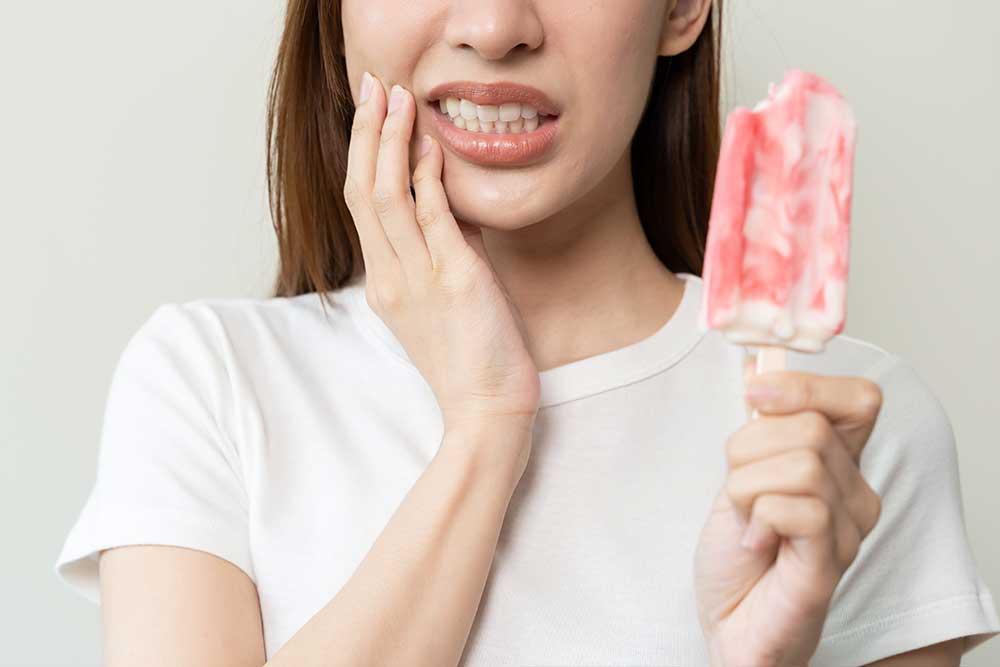Why do my teeth hurt?

Causes of tooth pain:
There are so many causes of tooth pain, we can’t cover them all here, but here are some of the most common problems that we see with our patients.
Tooth decay (cavities):
Tooth decay occurs when the tooth’s surface (enamel) becomes damaged by bad bacteria in the mouth. A strain of bacteria called mutans streptococcus is the main variant to blame, and it thrives off sugar. This bacteria forms an acidic plaque over time.
If you don’t brush your teeth properly, this plaque will eventually lead to holes in the teeth (cavities), infection and tooth loss.
Dentists can successfully clean and treat tooth decay, although cavities can’t be reversed or healed.
Tooth decay is fairly widespread among Australian adults. Only 11 percent of us have never had it, according to one survey.
It turns out our children aren’t faring much better either.
Here’s a sobering statistic from the same report:
Around 42 per cent of Aussie children between five and 10 have experienced tooth decay in their baby teeth.
Thankfully in most cases, tooth decay can be prevented with good oral hygiene, healthy eating and regular check-ups.
Abscessed tooth:
Bacterial infection can cause a pocket of pus to build up on the gums, near the root of the tooth. This is called a tooth abscess and it’s very painful.
Symptoms include swelling, fever, red gums and even trouble breathing or swallowing.
This is a dental emergency, so please seek treatment straight away, before the infection spreads to other parts of your body. Dentists can treat the infection with antibiotics. An extraction or root canal may also be needed, depending on the extent of damage.
Fractured tooth:
If you have a fractured or cracked tooth, you’ll notice that it hurts to chew.
You may also develop sensitivity to hot and cold foods or beverages. Tooth fractures are often caused by trauma to the tooth from accidents, or when chewing hard foods such as nuts and candy.
There are different solutions, depending on the extent of the fracture. A filling, bonding, cap, crown or veneer can be used to cover the crack (while mimicking the look and feel of natural enamel).
A root canal may be required to remove infected tissue, in cases where the pulp has been exposed. Unfortunately if the fracture is too deep, the tooth can’t be saved and must be removed.
Crowded or misaligned teeth:
You may experience pain in your teeth, gums and jaw if your teeth are pushing against each other.
Teeth usually become misaligned or crowded when there’s a lack of space in the mouth. This can be caused by teeth that are too big, or a jaw that’s too small.
Other contributing factors include having extra teeth or birth defects, such as a cleft lip or palate.
It’s common for people to have crowded or misaligned teeth. It’s better to treat these conditions at an early age, if possible, otherwise more complex intervention may be required as you get older.
Tooth pain treatment from home:
The causes of tooth pain can only be treated by seeing a dentist, but you can take steps at home to reduce your discomfort.
Over-the-counter pain medication:
Anti-inflammatory drugs such as ibuprofen and Advil help to reduce inflammation, which lowers pain. If you don’t want to take tablets, consider using an antiseptic gel called Benzocaine, which numbs the gums.
Your local pharmacist should be able to give you more tailored advice, based on your symptoms. As always, if you’re pregnant or worried about any kind of medication, please check with your doctor or dentist first.
Gargle with warm salt water:
You can get some relief by rinsing your mouth with warm saline water (add half a teaspoon of salt). This is a gentle way to lower pressure and swelling.
Cold or hot compression:
Wrap a clean towel around a hot or cold pack, and softly press the pack to the outside of your cheeks or lips, in the same spot where the pain is.
Small amounts of ginger root:
It sounds too good to be true, but chewing on fresh ginger root can dull pain to some extent.
All you have to do is cut a small piece of ginger and place it over the sore tooth. Bite down to extract the juice, which can then be swished around your mouth.
Don’t have ginger root in large quantities if you’re pregnant, as it may increase the risk of miscarriage. Ask your doctor how much is safe to take.
Don’t ignore tooth pain, go see a dentist.
A dentist is the only person who can figure out what’s causing your tooth pain, and then give you suitable treatment or medication for permanent relief. Book an appointment as soon as you notice pain in your mouth, or other symptoms.
Early intervention gives you the best chance of a full recovery. If you delay seeing your dentist, the problem may worsen to the point where you need more complicated (and expensive) treatment.
Our friendly team is based in Wahroonga, and we’re committed to providing the best dental care. Fill out this form or call us on (02) 9489 1107 to book an appointment.
